NATO Building Integrity Programme
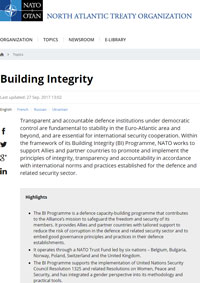
The Building Integrity (BI) Programme provides practical tools to help participating countries strengthen integrity, transparency and accountability and reduce the risk of corruption in the defence and security sectors. The programme promotes good practice, processes and methodologies, and provides countries with tailored support to make defence and security institutions more effective.
For more information please
visit the site
NATO BI Programme Website
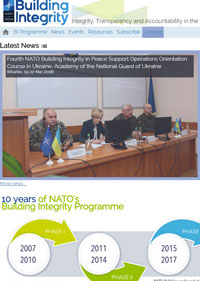
This is the web portal of NATO Building Integrity Programme. This programme provides practical tools to help participating countries strengthen integrity, transparency and accountability and reduce the risk of corruption in the defence and security sector. The programme promotes good practice, processes and methodologies, and provides countries with tailored support to make defence and security institutions more effective.
The BI Programme is tailored to meet national needs and requirements. It is demand-driven and participation is on a voluntary basis. The programme is open to all NATO Allies and partners (members of the Euro-Atlantic Partnership Council, the Mediterranean Dialogue, Istanbul Cooperation Initiative and partners across the globe). Requests from other countries are reviewed by NATO on a case-by-case basis.
For more information please
visit the site
CIDS resources section
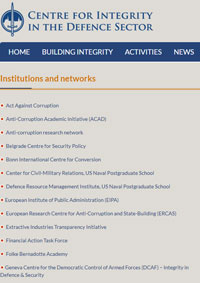
Centre for Integrity in the Defence Sector is a great resource for Building Integrity in Defence topics. Based in Norway, this organisation specialises in a variety of knowledge products from courses to publications, which can be found on their website. The CIDS website resource section can be of special value to those seeking a quick overview of key knowledge sources on this subject.
For more information please
visit the site
United Nations Office on Drugs and Crime (UNODC)
.jpg)
UNODC is a global leader in the fight against illicit drugs and international crime. Established in 1997 through a merger between the United Nations Drug Control Programme and the Centre for International Crime Prevention, UNODC operates in all regions of the world through an extensive network of field offices. UNODC mainly provides:
- Field-based technical cooperation projects to enhance the capacity of Member States to counteract illicit drugs, crime and terrorism
- Research and analytical work to increase knowledge and understanding of drugs and crime issues and expand the evidence base for policy and operational decisions
- Normative work to assist States in the ratification and implementation of the relevant international treaties, the development of domestic legislation on drugs, crime and terrorism, and the provision of secretariat and substantive services to the treaty-based and governing bodies.
For more information please
visit the site
UN ‘The Fight against Corruption’ Learning Tool
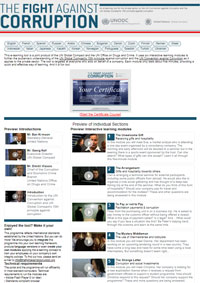
This e-learning tool is a joint product of the UN Global Compact and the UN Office on Drugs and Crime. The tool uses six interactive learning modules to further the audience’s understanding of the UN Global Compact’s 10th principle against corruption and the UN Convention against Corruption as it applies to the private sector. The tool is targeted at everyone who acts on behalf of a company. Each module only lasts about five minutes, providing a quick and effective way of learning.
For more information please
visit the site
UNODC TRACK ‘Tools and Resources for Anti-Corruption Knowledge’
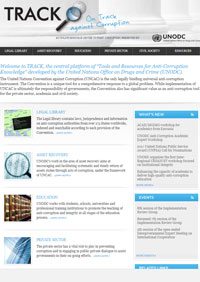
This is a web-based anti-corruption portal developed by the UNODC. This tool includes a legal library, online courses, a search engine specialised in anti-corruption literature, and other resources. The Legal Library on the United Nations Convention against Corruption (UNCAC) provides a gateway to an electronic database of legislation and jurisprudence relevant to UNCAC from over 175 States systematized in accordance with the requirements of the Convention. The TRACK portal brings together legal and non-legal knowledge on anti-corruption and asset recovery enabling Member States, the anti-corruption community and the general public to access this information in a central location. An anti-corruption learning platform is also incorporated, providing a common space where analytical tools generated by partner organizations can be searched and accessed by users world-wide.
For more information please
visit the site
UNODC SHERLOC
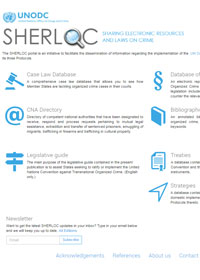
The SHERLOC knowledge management portal is a tool designed to facilitate the dissemination of information regarding the implementation of the UN Convention against Transnational Organised Crime and its protocols. In this portal, national examples of anti-corruption laws can be found, as well as tools for enhancing international cooperation in the fight against corruption and organised crime, along with other useful resources. The portal hosts a case law database, a database of legislation, a bibliographic database, and a directory of national competent authorities. The case law database contains jurisprudence on corruption, counterfeiting, cybercrime, drug offences, money laundering, obstruction of justice, participation in an organized criminal group, piracy, smuggling of migrants, trafficking in firearms, trafficking in cultural property, wildlife and forest crime, trafficking in persons and other crimes. The database of legislation is an electronic repository of laws relevant to the provisions of the United Nations Convention against Transnational Organized Crime (UNTOC). The bibliographic database is an annotated bibliography containing a synopsis of key articles that are searchable by countries, research methods and keywords. The directory contains the contact information of competent national authorities authorized to receive, respond to and process requests of assistance for matters related to organised crime.
For more information please
visit the site
UNODC Stolen Asset Recovery Initiative (StAR)
.jpg)
The Stolen Asset Recovery Initiative (StAR) is a partnership between the World Bank Group and the United Nations Office on Drugs and Crime that supports international efforts to end safe havens for corrupt funds. StAR works with developing countries and financial centres to prevent the laundering of the proceeds of corruption and to facilitate a more systematic and timely return of stolen assets.
StAR works with and helps bring together governments, regulatory authorities, donor agencies, financial institutions, and civil society organizations, fostering collective responsibility and action for deterrence, detection and recovery of stolen assets.
For more information please
visit the site
Transparency International UK Defence and Security
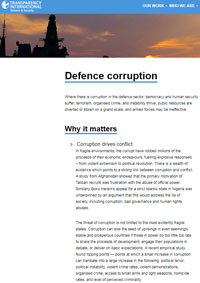
This programme aims to raise awareness of corruption in the defence sector and provide practical tools to reduce corruption risks. TI cooperates with governments and international organisations to enhance transparency in defence institutions; it also works with defence companies to raise industry standards in international defence contracting and develops centres and international networks of defence anti-corruption expertise.
For more information please
visit the site
Transparency International Anti-Corruption Glossary
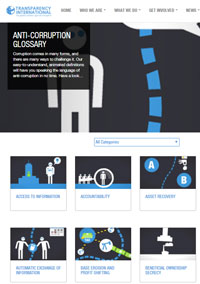
TI’s Anti- Corruption Glossary is an excellent digital resource. The glossary is a collection of concepts related to the topic of corruption defined and presented in a brief, clear and user-friendly manner. Thanks to its neat communication technique TI’s Anti-Corruption Glossary can be an attractive and useful tool for a very wide audience.
For more information please
visit the site
TI Defence Integrity Pacts
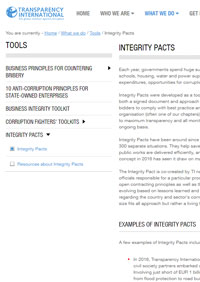
Integrity Pacts are a tool for preventing corruption in public contracting. They are essentially an agreement between the government agency offering a contract and the companies bidding for it that they will abstain from bribery, collusion and other corrupt practices for the extent of the contract. To ensure accountability, Integrity Pacts also include a monitoring system typically led by civil society groups.
For more information please
visit the site
Transparency and Accountability Initiative
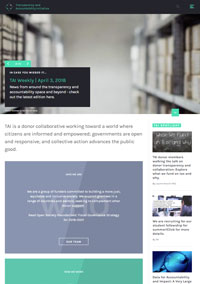
The Transparency and Accountability Initiative (T/A Initiative) is a donor collaborative working to expand the impact and scale of transparency, accountability and participation interventions.
For more information please
visit the site
CleanGovBiz Toolkit
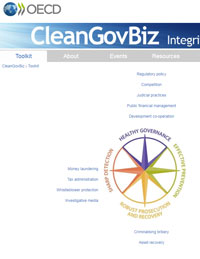
The Toolkit offers practical guidance on how corruption can best be tackled in multiple domains. This toolkit draws together relevant instruments to support the establishment of healthy systems of governance, prevent corrupt practices, detect corruption, prosecute delinquencies and remedy the consequences of corruption.
For each policy area contributing to the fight against corruption, users are provided with:
- Priority checklists
- Implementation guidance with examples of good practices
- Access to existing relevant standards and instruments, guides and manuals, case studies and reviews elaborated by international and civil society organisations
For more information please
visit the site
UN Instrument for Standardized International Reporting of Military Expenditures
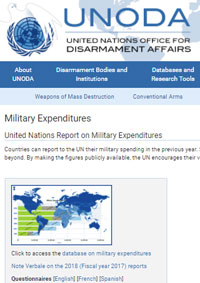
The purpose of the UN Standardized Reporting Instrument for Military Expenditures is to contribute to a broad effort to develop a set of specific measures for the purpose of facilitating the reduction of military expenditures. This tool also enhances transparency in military matters which is an essential element for building a climate of trust and confidence between States worldwide. The UN Standardized Reporting Instrument for Military Expenditures has also played an important role in acting as a model for similar reporting instruments, such as the one used by the Organization for Security and Cooperation in Europe (OSCE).
For more information please
visit the site
SIPRI Military Expenditure Database
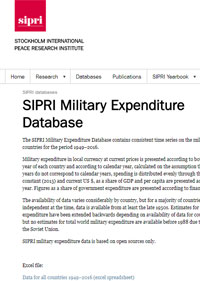
SIPRI data bases can be used for a variety of purposes. Most of all they contribute to transparency and accountability in defence spending and can prove to be of great value in the planning and budgeting phases. They also provide a historical record that serves as a reference for analysing what works and what doesn’t in defence spending.
For more information please
visit the site
European Defence Agency Procurement Gateway
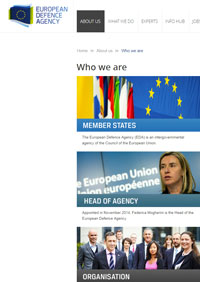
This is a tool that allows open and competitive bidding in defence procurement. The Gateway is held by the European Defence Agency. This tool contributes to the integrity of the decision making process in procurement by making it more transparent.
The tool enables Ministries of Defence in the subscribing Member States to publicise transparently their defence contract opportunities on a single European defence business portal; provides European defence-related companies an equal window of opportunity for accessing defence contract opportunities; encourages transparency and strengthens competition, laying the foundation for the development of the European Defence Equipment Market (EDEM).
For more information please
visit the site
European Partners against Corruption (EPAC)
.jpg)
The European Partners against Corruption (EPAC) is an independent, informal network bringing together more than 60 anti-corruption authorities and police oversight bodies from Council of Europe Member Countries. EPAC offers a medium for practitioners to share experiences, identify opportunities, and cooperate across national borders in developing common strategies and high professional standards.
For more information please
visit the site
NATO Support and Procurement Agency
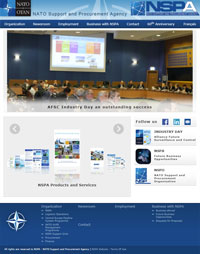
The NATO Support and Procurement Agency (NSPA) is a customer-funded agency, operating on a “no profit – no loss” basis. The NSPA is the executive body of the NATO Support and Procurement Organisation (NSPO), of which all 28 NATO nations are members. The NSPA brings together in a single organisation NATO’s logistics and procurement support activities, providing integrated multinational support solutions for its stakeholders. NSPA provides support to NATO by leveraging capabilities for new customers and geographic areas, and developing new capabilities in the areas of:
- Support to Operations and Exercises,
- Systems Procurement and Life-Cycle Management,
- Fuel Management,
- Strategic Transport and Storage,
- Logistics Services and Project Management.
For more information please
visit the site
World Economic Forum Partnering Against Corruption Initiative Principles for Countering Bribery
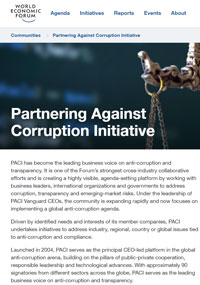
Partnering Against Corruption Initiative (PACI) is one of the Forum’s strongest cross-industry collaborative efforts and is creating a highly visible, agenda-setting platform by working with business leaders, international organizations and governments to address corruption, transparency and emerging-market risks. Driven by identified needs and interests of PACI Member companies, PACI undertakes initiatives to address industry, regional, country or global issues in anti-corruption and compliance.
For more information please
visit the site
U4 Anti-Corruption Resource Centre
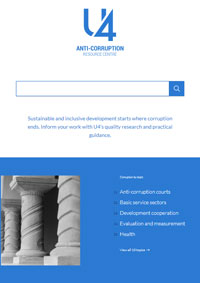
U4 offers relevant anti-corruption material, including applied research (featured under Themes), through an extensive web-based resource centre. U4 also runs in-country workshops and online courses on anti-corruption measures and strategies for partner agencies and their counterparts.
For more information please
visit the site
Canadian Council for Public-Private Partnerships, PPP project tracker
![]()
Canadian PPP Project Database is a tool developed by the Canadian Council for Public-Private Partnerships. This tool allows keeping track of current and past projects, their progress and status. Projects are organised by sector and geographical area. The database is an overview of the projects undertaken by Canada within the framework of public-private partnerships and contributes to transparency and facilitates public oversight.
For more information please
visit the site
P3 Bulletin Project Tracker
![]() For more information please
For more information please
visit the site
Infra PPP Project Tracker
![]() For more information please
For more information please
visit the site
Legislative Documents

- UN Convention Against Corruption
- UN Convention on Transnational Organized Crime
- This Convention is supplemented by three Protocols:
- UN General Assembly and International Committee of the Red Cross, Montreux Document on Pertinent International Legal Obligations and Good practices for States Related to Operations of Private Military and Security Companies During Armed Conflict.
- Resolution 51/59 UN General Assembly: International Code of Conduct for public officials
- United Nations Declaration on Crime and Public Security
- Council of Europe Recommendation Rec (2000)10
- Council of Europe Criminal Law Convention on Corruption
- Council of Europe Civil law Convention against Corruption
- Council of Europe Convention on Laundering, Search, Seizure and Confiscation of Proceeds of Crime
- Council of Europe Resolution (97) 24 on the twenty guiding principles for the fight against corruption.
- Council of Europe Convention on access to official documents
- Council of Europe Recommendation Rec (2002)2
- EU Convention on the fight against corruption involving officials of the European Communities or officials of member states of the EU.
- EU Convention on the protection of the European Communities’ Financial Interests
- European Convention on Extradition
- OSCE Code of Conduct of Politico-Military Aspects of Security
- OECD Convention on Combating Bribery of Foreign Officials in International Business Transactions,1997
- OECD Recommendation for further Combating Foreign Bribery, 2009
- OECD Good Practice Guidance on Internal Controls, Ethics, and Compliance, 2010
- OECD Best Practices for Budgetary Transparency, 2002
- International Monetary Fund: Code of Good Practices on Fiscal Transparency
- Inter-American Convention Against Corruption
- African Union Convention on Preventing and Combating Corruption
- INTOSAI International Standards of Supreme Audit Institutions
- INTOSAI Lima Declaration of Guidelines on Auditing Precepts.
- INTOSAI Guidelines for Internal Control in the Public Sector.
- INTOSAI Code of Ethics
- ISO 15288
- NATO Allied Administrative publication AAP-48, NATO system life cycle stages and processes
Handbook on Combating Corruption
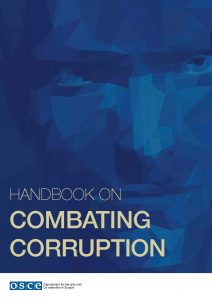
This handbook is a reference guide on available legal tools, the latest legislative and policy trends, and pertinent measures and practices to prevent and suppress corruption. The handbook is aimed at raising awareness of the range of international instruments available to national policymakers and anti-corruption practitioners.
For more information please
download the document Eng
Building Integrity Self-Assessment Questionnaire and Peer Review Process: A Diagnostic Tool for National Defence Establishments
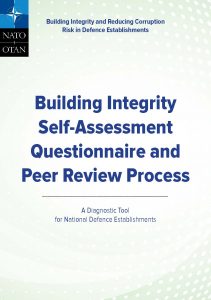
This Building-Integrity handbook contains a questionnaire, guidance on organising the process in-country, a sample note which can be used to brief the Defence Minister or Head of the Armed Forces on how to introduce the peer review process, and an outline of the format of the visit by the NATO review team. A separate Word document is available for recording the results of the questionnaire. While aimed primarily at Defence, the nation may apply the Integrity Self-Assessment Process to other Ministries and institutions in the security sector.
For more information please
download the document Eng
Transparency International Business Principles for Countering Bribery
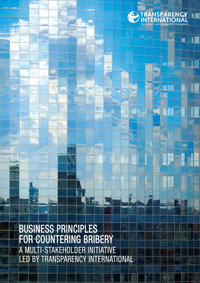
The Business Principles for Countering Bribery were originally developed through an extensive multi-stakeholder process involving companies, non-governmental organisations and trade unions, as a tool to assist enterprises to develop effective approaches to countering bribery in all aspects of their activities. The Business Principles aim to provide a framework that can assist enterprises in developing, benchmarking or strengthening their anti-bribery programmes. The Business Principles reflect a high, yet achievable standard of anti-bribery practice. They apply to the bribery of public officials as well as private-to-private transactions.
For more information please
visit the site
NATO (2013), Code of Conduct
-Code-of-Conduct.jpg)
NATO Code of Conduct is intended to be read in the context of the NATO Civilian Personnel Regulations, other personnel policies, or applicable national military regulations.
For more information please
download the document Eng
APEC Anti-Corruption Code of Conduct for Business
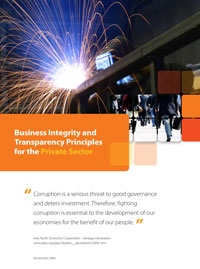
The APEC Code of Conduct for Business is a practical example of an Anti-Corruption Code of Conduct.
For more information please
download the document Eng
OECD Best Practices for Budget Transparency
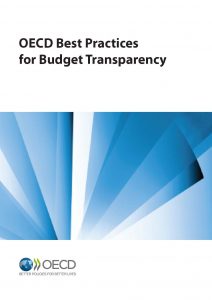
This is a reference tool for member and non-member countries to use in order to increase the degree of budget transparency in their respective countries. The Best Practices are organised around specific reports for presentational reasons only. Different countries will have different reporting regimes and may have different areas of emphasis for transparency. This publication is based on different member-countries’ experiences.
For more information please
download the document Eng
World Bank Integrity Compliance Guidelines
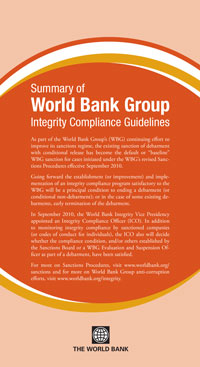
The Summary of World Bank Group Integrity Compliance Guidelines incorporates standards, principles, and components commonly recognized by many institutions and entities as good governance and anti-fraud and corruption practices. Although they are directed principally at sanctioned “parties,” others are encouraged to consider their appropriateness for adoption. They are not intended to be all-inclusive, exclusive or prescriptive; rather a party’s adoption of these Guidelines, or variants thereof, should be determined based on that party’s own circumstances.
For more information please
download the document Eng
International Chamber of Commerce Rules on Combating Corruption
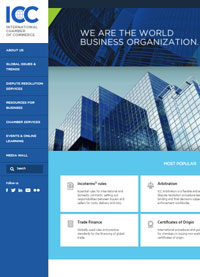
The ICC Rules on Combating Corruption constitute the cornerstone of ICC’s anti-corruption work, serving both as a tool for self-regulation by business and as a roadmap for governments in their efforts to fight extortion and bribery.
For more information please
visit the site
Integrity Action Plan: A Handbook for Practitioners in Defence Establishments
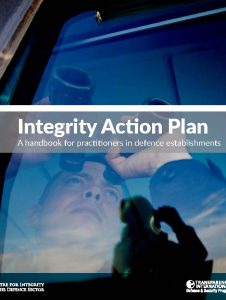
This handbook on Integrity Action Plans aims to help practitioners in defence establishments produce real and lasting change. The handbook outlines how practitioners ought to assess corruption risks and address identified weaknesses and shortcomings. Furthermore, the Action Plan emphasises the need for leadership and active support from the top in order to secure a clear mandate and how to tailor the chosen approach to the institutional context.
For more information please
download the document Eng
Ethical Guidelines for Contact with Business and Industry in the Defence Sector
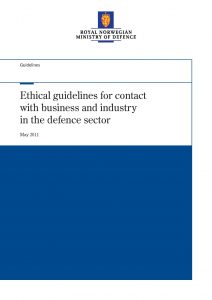
“Ethical Guidelines for Contact with Business and Industry in the Defence Sector” was first issued by the Ministry of Defence in April 2007. This revised edition of these guidelines aims to clarify and simplify the rules that apply. The revision is part of the development of the Ministry of Defence's Action Plan for Attitudes, Ethics and Leadership (AEL).
For more information please
download the document Eng
Action Plan on Attitudes, Ethics and Leadership
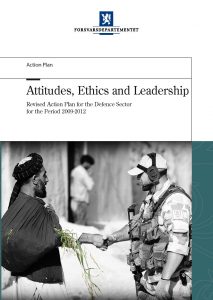
The Norwegian defence sector’s employees face ethical and attitudinal challenges and dilemmas every day: in military operations, in contact and collaborations with business and other private and public actors, in research activities, or in day-to-day work. Therefore, leaders and employees must always be equipped to make good decisions. Latter is the objective of this publication which provides an action plan on attitudes, ethics and leadership.
For more information please
download the document Eng
Core Values of Norway’s Defence Sector
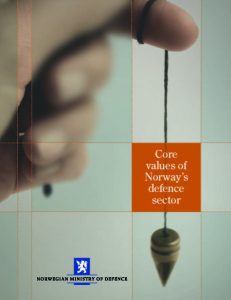
The Norwegian defence sector promotes certain general values of openness, broadmindedness, respect, responsibility, and courage. The sector encompasses the Ministry of Defence and four administratively subordinate agencies: the Norwegian Armed Forces, the Norwegian Defence Estates Agency, the Norwegian National Security Authority, and the Norwegian Defence Research Establishment. All bodies of the Norwegian Ministry of Defence must adhere to the values platform outlined in this publication.
For more information please
download the document Eng
Security Sector Governance and Reform Guidelines for OSCE Staff
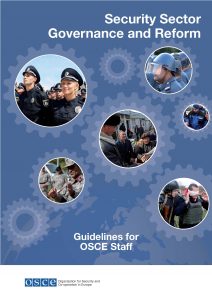
These guidelines provide OSCE staff with advice on supporting cross-dimensional approaches to security sector governance and reform (SSG/R). The purpose of such approaches is to promote a move away from the kind of fragmented support which has a limited impact and towards the practice of building on cross-dimensional synergies. This is done in order to provide coherent and effective support for the pursuit of common strategic SSG/R objectives. While the guidelines are designed for the use of OSCE staff, they may also be of relevance to other national and international actors seeking to enhance their support in the field of SSG/R.
For more information please
download the document Eng
U4 Issue 8 (2013), Methods for learning what works and why in anti-corruption
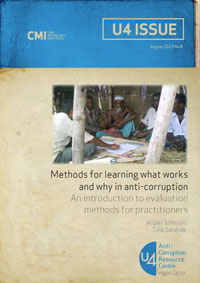
This paper offers practical guidance to practitioners who design, implement, and disseminate evaluations and research on anti-corruption. A range of quantitative and qualitative methods can be used to answer operational questions on the impact of anti-corruption interventions. Although some methods can produce stronger evidence than others for a specific evaluation, there are tradeoffs between rigour and costs and between aspiration and feasibility. Donors should let the evaluation question, programme attributes, and availability of data determine the most appropriate methods for a given study. With careful planning and adequate resources, donors can use many of the methods presented in this paper. This should give more reliable results and produce needed knowledge on what works in anti-corruption, laying the basis for more effective anti-corruption initiatives. U4 is a web-based resource centre for development practitioners who wish to effectively address corruption challenges in their work.
For more information please
visit the site
Building Integrity and Reducing Corruption in Defence: A Compendium of Best Practices
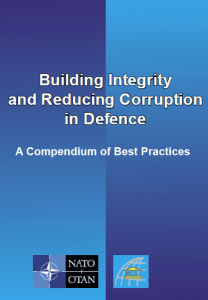
This compendium is the product of cooperation between Transparency International UK, the NATO Program for Peace team, and DCAF. The Compendium focuses on concepts and tools which ensure good practices in defence management and policy through “building integrity.” Designed primarily as an introduction and reference tool, defence personnel, civilians in the defence sphere, democratic institutions, and civil society will also find materials on building integrity and anti-corruption measures which are relevant to their own security governance activities.
Public Oversight of the Security Sector: A Handbook for Civil Society Organizations
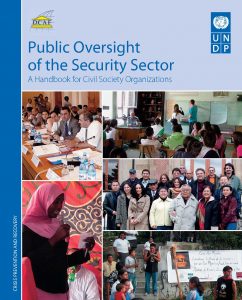
This Handbook provides structured guidance for civil society organisations (CSOs) on the role they can play in democratic security sector oversight. Although many CSOs have facilitated security sector reform processes in transition and post-conflict states, much of their potential remains untapped. Similarly, the longer term role CSOs play in maintaining a democratically-managed security sector is sometimes under-emphasised in the developed and developing worlds. The Handbook is designed primarily for civil society and non-governmental organisations. It is also relevant to democratic institutions, democratic representatives, policymakers, SSR practitioners, researchers, security sector institutions, the media, and international organisations partnering with CSOs on democratic security governance issues.
For more information please
download the document Eng
Security Sector Reform: Integrated Technical Guidance Notes
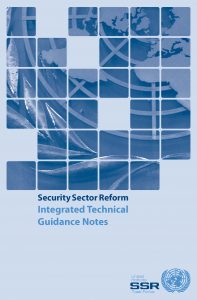
The UN SSR Integrated Technical Guidance Notes are a useful tool for anyone interested in Security Sector Reform and Democratic Security Sector Governance. The purpose of the Integrated Technical Guidance Notes (ITGNs) is therefore to foster a “One United Nations” approach to SSR by providing a common framework to guide United Nations support to nationally led SSR efforts.
For more information please
download the document Eng
Making Intelligence Accountable: Legal Standards and Best Practice for Oversight of Intelligence Agencies
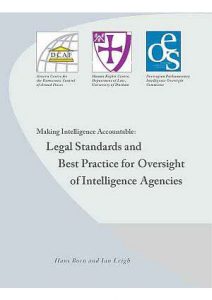
This publication classifies and evaluates the legal standards that currently exist regarding the democratic accountability of intelligence services. The publication also identifies and recommends best practices applicable to both transition countries and well-established democracies.
Overseeing Intelligence Services Toolkit
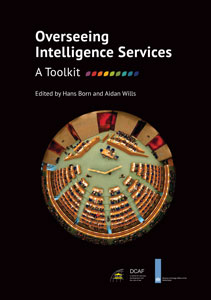
DCAF’s toolkit on overseeing intelligence services is a compendium of booklets (tools) that provides policy-relevant information on the establishment and consolidation of independent bodies to oversee state organisations involved in the collection, analysis, production and dissemination of intelligence in the national security domain.
Parliamentary Oversight of the Security Sector: Principles, Mechanisms, and Practices
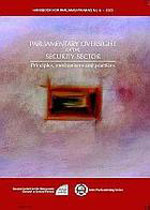
Parliaments have a vital role to play in the good governance of the security sector and the provision of transparent and accountable public security. This handbook is divided into eight sections, each containing several chapters and can be read in two different ways. A complete reading of the Handbook will provide the most comprehensive understanding of security issues and the role of parliamentary oversight. However, it is also possible to make a selective reading of those sections and chapters which are of particular concern to the user. The index and various cross-references are designed for this purpose. Throughout the Handbook, there are separate boxes which clarify complex issues in the main text, provide examples of laws or regulations, and highlight practices of parliamentary oversight of the security sector in various countries. At the end of most chapters, there is a section called “what you can do as a parliamentarian," where concrete recommendations are given. However, these recommendations must be observed from the national context.
Anti-Corruption Ethics and Compliance Handbook for Business
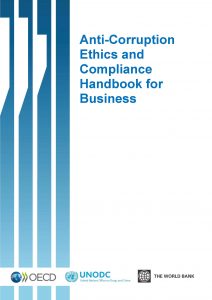
The Handbook has been developed to serve as a useful, practical tool for companies seeking compliance advice in one, easy-to-reference publication. The Handbook is divided into three sections. The first section provides an overview of the international anti-corruption framework, within which companies conducting international business must operate. The second section provides a brief introduction to how companies can assess their risk in order to begin developing an effective anti-corruption ethics and compliance programme. The third and most significant section brings together major business guidance instruments.
For more information please
download the document Eng
Good Practice Guidance on Internal Controls, Ethics and Compliance
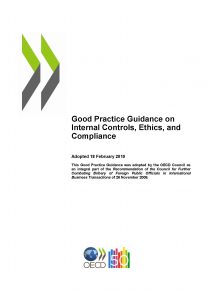
This Good Practice Guidance is addressed to companies for establishing and ensuring the effectiveness of internal controls, ethics, and compliance programmes or measures for preventing and detecting the bribery of foreign public officials in their international business transactions. Guidelines are also addressed to business organisations and professional associations which play an essential role in assisting companies in these efforts. It recognises that to be effective, such programmes, or measures, should be interconnected with a company’s overall compliance framework. This Guidance is intended to serve as non-legally binding guidance to companies in establishing effective internal controls, ethics, and compliance programmes or measures for preventing and detecting foreign bribery.
For more information please
download the document Eng
OECD Glossaries: Corruption: A Glossary of International Standards in Criminal Law
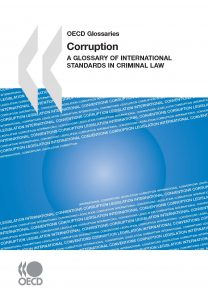
This Glossary explains the key elements required to classify corruption as a criminal act, according to three major international conventions: the OECD Convention on Combating Bribery of Foreign Public Officials in International Business Transactions; the Council of Europe’s Criminal Law Convention on Corruption; the United Nation’s Convention against Corruption. The specific purpose of this Glossary is to assist the countries of the OECD Anti-Corruption Network for Eastern Europe and Central Asia in their efforts to reform national anti-corruption criminal legislation according to the requirements of the above-mentioned conventions. This tool seeks to remedy the lack of knowledge about international law and recent developments in international treaties that some national legislators may face. It should be useful for legal practitioners in any country that aims to strengthen international cooperation and domestic rules to fight corruption.
For more information please
download the document Eng
Anti-Corruption Authority Standards
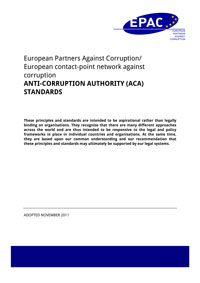
This document lists ten guiding principles and parameters on the notion of independence of Anti-Corruption bodies. These principles and standards are intended to be aspirational for, rather than legally binding on, organisations. They recognise that there are many different approaches across the world and are, thus, intended to be responsive to the legal and policy frameworks established in individual countries and organisations.
For more information please
download the document Eng
Legislative Guide for the Implementation of the UNCAC
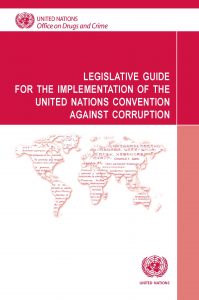
The United Nations Convention against Corruption was adopted by the General Assembly by its resolution 58/4 of 31 October 2003. The objective of the present practical legislative guide is to assist States seeking to ratify and implement the Convention by identifying legislative requirements, issues arising from those requirements and various options available to States as they develop and draft the necessary legislation.
For more information please
download the document Eng
Technical Guide to the United Nations Convention against Corruption
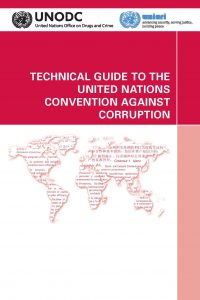
The present Technical Guide primarily focuses on the provision to anti-corruption practitioners and authorities of relevant technical advice, tools and examples of good practices to make the articles of the Convention operational. The Technical Guide attempts to highlight policy issues, institutional aspects and operational frameworks related to the full and effective implementation of the provisions of the Convention. The objective of the Guide is to lay out a range of policy options and considerations that each State Party needs, or may wish, to take into account in national efforts geared towards implementation of the Convention. Thus, the Guide intends only to raise and highlight issues pertinent to such implementation and by no means purports to be used as a complete and exhaustive counselling material for national policymakers, especially in view of the different legal systems and traditions and the varying levels of institutional capacity among States Parties.
For more information please
download the document Eng
United Nations Handbook on Practical Anti-Corruption Measures for Prosecutors & Investigators
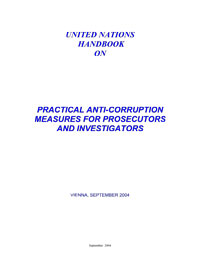
The United Nations Handbook on Practical Anti-Corruption Measures for Prosecutors and Investigators is part of a larger package of materials intended to provide information and resource materials for countries developing and implementing anti-corruption strategies at all levels, as well as for other elements of civil society with an interest in combating corruption.
For more information please
download the document Eng
United Nations Guide on Anti-Corruption Policies
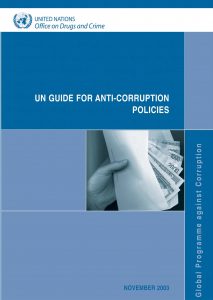
The United Nations Guide on Anti-Corruption Policies, which contains a general outline of the nature and scope of the problem of corruption and a description of the major elements of anti-corruption policies, is suitable for use by political officials and senior policy-makers.
For more information please
download the document Eng
The United Nations Anti-Corruption Toolkit
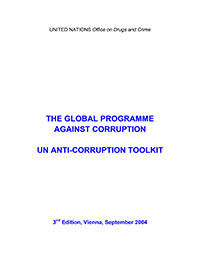
The United Nations Anti-Corruption Toolkit contains a detailed set of specific Tools intended for use by officials called upon to elaborate elements of a national anti-corruption strategy and to assemble these into an overall strategic framework, as well as by officials called upon to develop and implement each specific element. Case Studies, setting out practical examples intended to illustrate the use of individual tools and combinations of tools in actual practice are included in the Toolkit. They provide information about the conditions under which a particular programme will or will not work and how various tools can be adapted or modified to suit the circumstances in which they are likely to be used.
For more information please
download the document Eng
Compendium of International Legal Instruments on Corruption
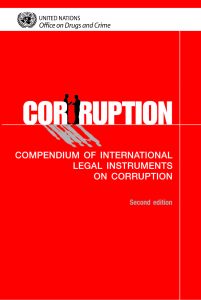
The Compendium of International Legal Instruments on Corruption compiles for reference all the major relevant global and regional international treaties, agreements, resolutions and other instruments. These include legally binding obligations, as well as some "soft-law" or normative instruments intended to serve as non-binding standards.
For more information please
download the document Eng
Mutual Legal Assistance Request Writer Tool
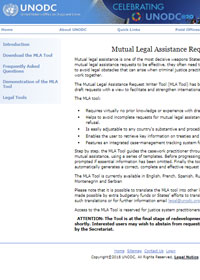
The Mutual Legal Assistance Request Writer Tool (MLA Tool) has been developed by UNODC to assist States to draft requests with a view to facilitate and strengthen international cooperation.
The MLA tool:
- Requires virtually no prior knowledge or experience with drafting mutual legal assistance requests
- Helps to avoid incomplete requests for mutual legal assistance and therefore minimizes the risk of delay or refusal.
- Is easily adjustable to any country’s substantive and procedural law
- Enables the user to retrieve key information on treaties and national legislation
- Features an integrated case-management tracking system for incoming and outgoing requests
For more information please
visit the site
Resource Guide on Strengthening Judicial Integrity and Capacity
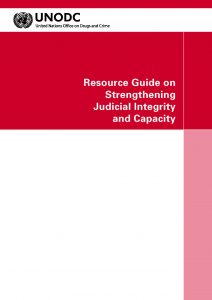
The purpose of this Guide is to support and inform those who are tasked with reforming and strengthening the justice systems of their countries. The Resource Guide also aims to provide development partners, international organizations, and other providers of technical assistance who deliver support to this process.
For more information please
download the document Eng
Building Public Support for Anti-Corruption Efforts
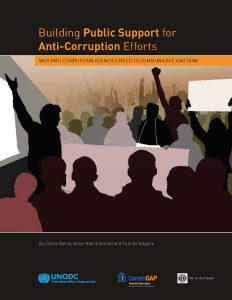
This paper provides a practical overview of how an agency may work with the media to win the support of the public in the fight against corruption. The paper is intended as a “how-to” guide to help agencies understand how to control the way they present themselves to the public, how to frame their agencies’ work, and how to develop allies in the press and the community at large. Overall, this paper is designed to help anti-corruption agencies become more effective in fighting corruption.
For more information please
download the document Eng
Guidebook on Anti-Corruption in Public Procurement and the Management of Public Finances
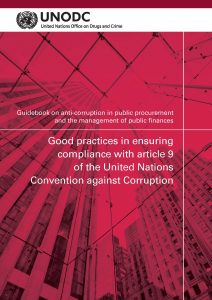
This Guidebook serves as a reference material for governments, international organizations, the private sector, academia and civil society, by providing an overview of good practices in ensuring compliance with article 9 of UNCAC, which requires establishing appropriate systems of public procurement, as well as appropriate systems in the management of public finances.
For more information please
download the document Eng
Group of States Against Corruption (GRECO)
.jpg)
The Group of States against Corruption (GRECO) was established in 1999 by the Council of Europe to monitor States’ compliance with the organisation’s anti-corruption standards. GRECO’s objective is to improve the capacity of its members to fight corruption by monitoring their compliance with Council of Europe anti-corruption standards through a dynamic process of mutual evaluation and peer pressure. The group helps to identify deficiencies in national anti-corruption policies, prompting the necessary legislative, institutional and practical reforms. GRECO also provides a platform for sharing best practices in the prevention and detection of corruption.
For more information please
visit the site
Principles for Transparency and Integrity in Lobbying
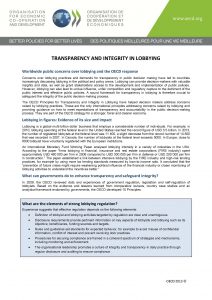
The OECD Principles for Transparency and Integrity in Lobbying help decision-makers address concerns raised by lobbying practices. These are the only international principles addressing concerns raised by lobbying and providing guidance on how to meet expectations of transparency and accountability in the public decision-making process. They are part of the OECD strategy for a stronger, fairer and cleaner economy.
For more information please
download the document Eng
UNDP Global Anti-Corruption Initiative (GAIN)
.jpg)
The objectives of GAIN are to integrate anti-corruption solutions in service delivery to contribute to Millennium Development Goals acceleration and post-2015 development goals; to strengthen state/institutional capacity to implement UNCAC and prevent corruption; to mitigate corruption risks in climate finance and natural resource management; to enhance civic engagement, youth and women’s empowerment for increased transparency and accountability at national and local levels; and improve results-based management and institutional effectiveness on anti-corruption.
For more information please
visit the site
Financial Action Task Force (FATF)
.jpg)
The Financial Action Task Force (FATF) is an inter-governmental body established in 1989 by the Ministers of its Member jurisdictions. The objectives of the FATF are to set standards and promote effective implementation of legal, regulatory and operational measures for combating money laundering, terrorist financing and other related threats to the integrity of the international financial system. The FATF is therefore a “policy-making body” which works to generate the necessary political will to bring about national legislative and regulatory reforms in these areas.
For more information please
visit the site
The Open Government Partnership (OGP)
.jpg)
The Open Government Partnership is a multilateral initiative that aims to secure concrete commitments from governments to promote transparency, empower citizens, fight corruption, and harness new technologies to strengthen governance.
For more information please
visit the site
OECD Istanbul Anti-Corruption Action Plan
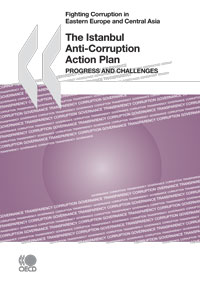
The Istanbul Anti-corruption Action Plan is a sub-regional peer review programme launched in 2003 in the framework of the Anti-Corruption Network. The programme supports anti-corruption reforms through country reviews and continuous monitoring of implementation of recommendations, which promote the UN Convention against Corruption and other international standards and best practice. This programme:
- reviews the legal and institutional frameworks for fighting corruption and makes recommendations
- monitors progress in implementing the recommendations
The results are discussed at regional meetings and published as country and progress reports.
For more information please
download the document Eng
Guidance Note: UNCAC Self-Assessments: Going Beyond the Minimum
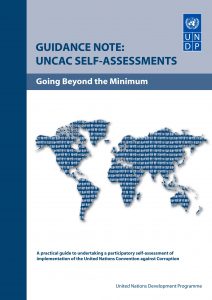
The UN Convention Against Corruption Self-Assessment process is an opportunity to engage in national dialogue on anti-corruption policies and programmes and stimulate reforms to curb corruption. This practical Guidance Note provides a methodology for national stakeholders on how to conduct a comprehensive and participatory Self-Assessment of UNCAC implementation.
For more information please
download the document Eng



